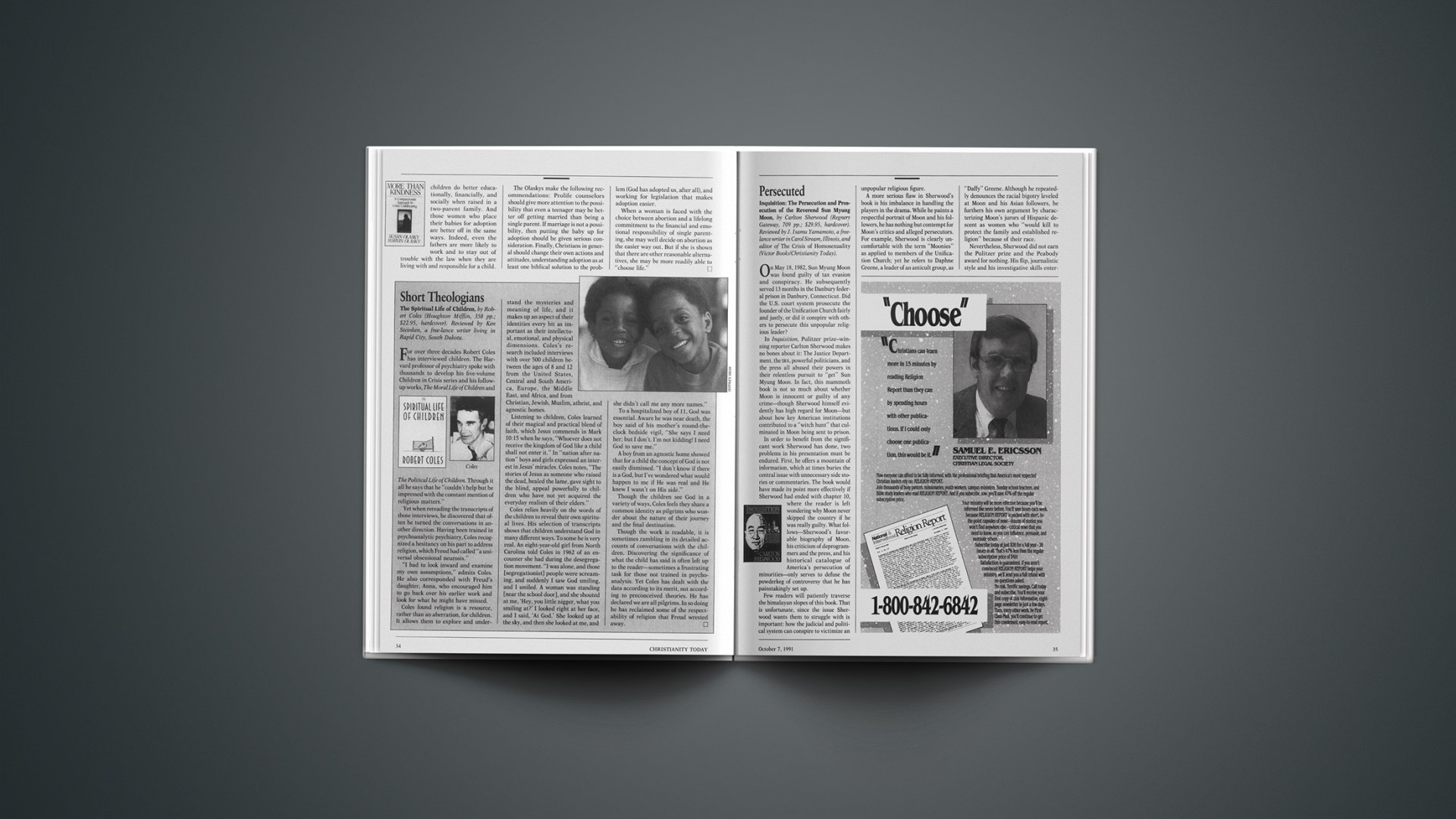Inquisition: The Persecution and Prosecution of the Reverend Sun Myung Moon, by Carlton Sherwood (Regnery Gateway, 709 pp.; $29.95, hardcover). Reviewed by J. Isamu Yamamoto, a free-lance writer in Carol Stream, Illinois, and editor of The Crisis of Homosexuality (Victor Books/Christianity Today).
On May 18, 1982, Sun Myung Moon was found guilty of tax evasion and conspiracy. He subsequently served 13 months in the Danbury federal prison in Danbury, Connecticut. Did the U.S. court system prosecute the founder of the Unification Church fairly and justly, or did it conspire with others to persecute this unpopular religious leader?
In Inquisition, Pulitzer prize-winning reporter Carlton Sherwood makes no bones about it: The Justice Department, the IRS, powerful politicians, and the press all abused their powers in their relentless pursuit to “get” Sun Myung Moon. In fact, this mammoth book is not so much about whether Moon is innocent or guilty of any crime—though Sherwood himself evidently has high regard for Moon—but about how key American institutions contributed to a “witch hunt” that culminated in Moon being sent to prison.
In order to benefit from the significant work Sherwood has done, two problems in his presentation must be endured. First, he offers a mountain of information, which at times buries the central issue with unnecessary side stories or commentaries. The book would have made its point more effectively if Sherwood had ended with chapter 10, where the reader is left wondering why Moon never skipped the country if he was really guilty. What follows—Sherwood’s favorable biography of Moon, his criticism of deprogrammers and the press, and his historical catalogue of America’s persecution of minorities—only serves to defuse the powderkeg of controversy that he has painstakingly set up.
Few readers will patiently traverse the himalayan slopes of this book. That is unfortunate, since the issue Sherwood wants them to struggle with is important: how the judicial and political system can conspire to victimize an unpopular religious figure.
A more serious flaw in Sherwood’s book is his imbalance in handling the players in the drama. While he paints a respectful portrait of Moon and his followers, he has nothing but contempt for Moon’s critics and alleged persecutors. For example, Sherwood is clearly uncomfortable with the term “Moonies” as applied to members of the Unification Church; yet he refers to Daphne Greene, a leader of an anticult group, as “Daffy” Greene. Although he repeatedly denounces the racial bigotry leveled at Moon and his Asian followers, he furthers his own argument by characterizing Moon’s jurors of Hispanic descent as women who “would kill to protect the family and established religion” because of their race.
Nevertheless, Sherwood did not earn the Pulitzer prize and the Peabody award for nothing. His flip, journalistic style and his investigative skills entertain while they inform, making this massive account less formidable.
What is more important, Sherwood addresses the legal improprieties in Moon’s trial with insight. For instance, why did the Justice Department refuse to allow Takeru Kamiyama, Moon’s friend and codefendant, to have his own interpreter during the grand jury proceedings, but instead forced him to respond through an amateurish interpreter, which led to his perjury conviction? More startling is why Judge Goettel refused to grant Moon’s desire to have a bench trial rather than a trial by jury, given Moon’s negative public profile.
The questions continue to compound, and no matter what one thinks about Moon and his religion or about the slanted perspective of this book, readers must struggle with the judicial actions in Sun Myung Moon’s case. If Moon’s religious liberties were violated, then the religious liberties of all religious leaders are threatened.
Sherwood mentions that some evangelicals, such as Jerry Falwell and Joseph Lowery, entered amicus curiae (friend of the court) briefs on behalf of Moon, though they clearly dissociated themselves from the theology of Moon and his church. But he says little else about them, though that does not minimize the importance of Moon’s trial as it relates to Christians.
Inquisition is not just about the trial of Sun Myung Moon; it puts on trial our judicial system in the context of religious liberties. It is our duty to examine the evidence and speak out for justice, not only for ourselves, but for those who believe differently.










